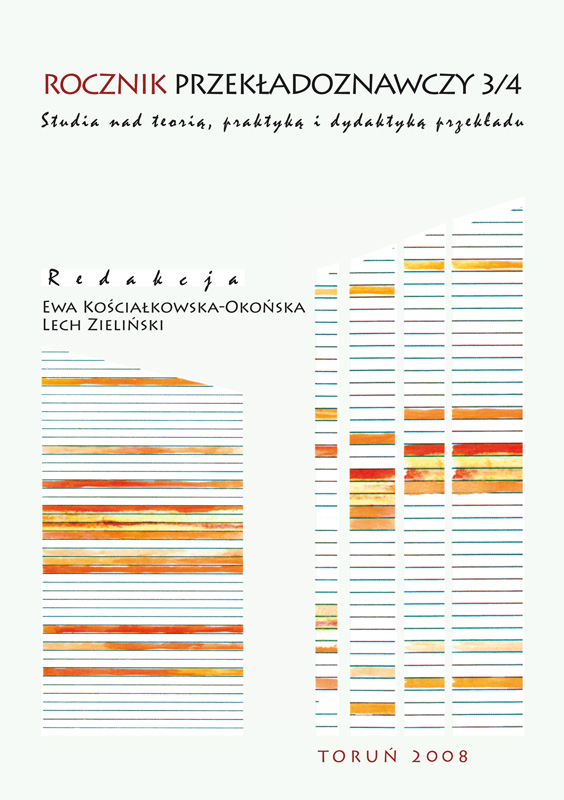Structure and meaning of syntagmatic compounds in Polish and French legal terminology
DOI:
https://doi.org/10.12775/RP.2008.013Keywords
syntagmatic compound, legal translationAbstract
Syntagmatic compounds are quite frequently encountered in legal terminology, although they are not always taken into account in bilingual dictionaries. Therefore, most terms and their meanings may be found in legal texts. The Z. Harris’s distribution method, supplemented with cognitive elements (cf. P. Lerat), is a reliable analytical method in corpus linguistics. The method, postulated in this article, considers two levels: level of expression (transformed units of the language system) and metalinguistic level (elementary sentences). Instruments for the description of structures and meanings of syntagmas (compound words and transformed sentences) are scenarios (conceptual structures of a certain entity consisting of typical actions) and expression schemata (predicative-argumentative structures of elementary sentences designating a given scenario) which are then condensed as a result of focusing on a given element in accordance with pragmatic factors of validity and informativity. Condensation and focusing are illustrated on the example of endocentric compounds in French (whose N1 is a predicative noun demande, rooted in the request modality scenario) and their equivalents in Polish. Examples taken from Polish and French legal dictionaries show tendencies, specifi c to each language, to condense a predicate or an argument in the N1 determinant element. Examples excerpted from parallel texts indicate the possibility of emergence of other equivalents, specific to a given text. The distribution-cognitive method is an instrument for describing the meaning of a compound word with a simple structure as, for instance, the term dobro wspolne (Eng. common good). Th is meaning differs from text to text and is culturally determined. The analysis of terms in the text is a response, on the one hand, to the occurrence of new equivalents resulting from different focusing on the level of predicative-argumentative structures and from formal reduction and, on the other, to the occurrence of various meanings of one verbal form.
References
Dolata-Zarod, A., 2005, „Specyfika tłumaczenia tekstu specjalistycznego na przykładzie francuskiego języka prawniczego”, [w:] Język trzeciego tysiąclecia III, tom 2: Konteksty przekładowe, Piotrowska, M. (red.), Kraków, s. 129–135.
Fijałkowska, M., 2005, Le terme ≪marque communautaire≫ dans la langue juridique polonaise et francaise, praca magisterska, KUL.
Harris, Z. S., 1976, Notes du cours de syntaxe (trad. par M. Gross), Paris.
Harris, Z. S., 1990, „La genese de l’analyse des transformations et de la metalangue”, Langages 99, s. 9–20.
Jacques, M.-P., 2003, Approche en discours de la reduction des termes complexes dans les textes specialises, Doctorat Nouveau Regime, Universite Toulouse II Le Mirail.
Kleiber, G., 1994, Nominales. Essais de semantique referentielle, Paris.
Kleiber, G., 1999, Problemes de semantiques. La polysemie en questions, Lille.
Lerat, P., 2002a, „Un niveau d’analyse privilegie pour les langues de specialites europeennes: le schema d’enonce”, [w:] Prospettive linguistiche della nuova Europa, Schena L. i in. (red.), Milan, 67.
Lerat, P., 2002b, „Vocabulaire juridique et schemas d’arguments juridiques”, Meta, 47–2, s. 155–162. Lerat, P., 2006, „Le predicat semantique droit sur le Web” Melanges off erts a Marie-Francoise Mortureux (LINX, mars 2006).
Śliwa, D., 2000, Aspects denominatifs de la morphologie derivationnelle (etude des noms d’artefacts en francais et en polonais), Lublin.
Śliwa, D., 2006, „Le terme bien commun et la construction du sens. Mais dans quel contexte?”, [w:] Mots, termes et contextes, Actes des septiemes Journees Scientifi ques du reseau des chercheurs Lexicologie, Terminologie, Traduction, Bruxelles, 6–10 septembre 2005, AUF/LTT-ISTI, Blampain D. I. in. (red.), Bruxelles, s. 643–650.
Terral, F., 2004, „L’empreinte culturelle des termes juridiques”, Meta, XLIX, 4, s. 876–890.
Thoiron, Ph., 1994, „La terminologie multilingue: une aide a la maitrise des concepts”, Meta, 39–4, s. 765–773.
(AM) Machowska, A., 2003, Słownik terminologii prawniczej, polsko-francuski, Oficyna Wydawnicza Branta.
(JP) Pieńkos, J., 1995, Francusko-polski leksykon, prawo–ekonomia–handel, PWN.
Downloads
Published
Issue
Section
Stats
Number of views and downloads: 759
Number of citations: 0



